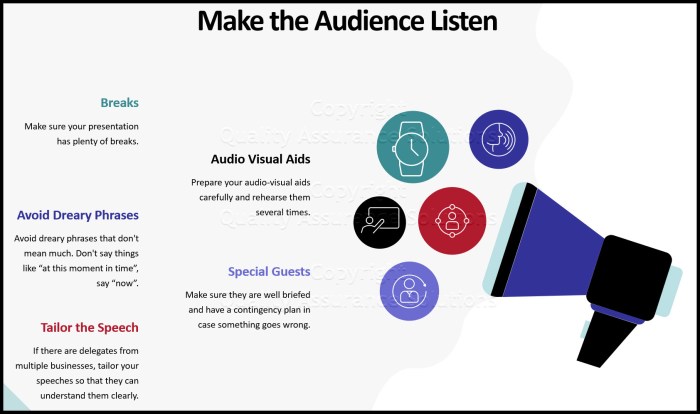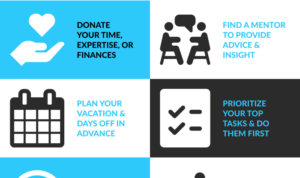Public Speaking Tips takes the spotlight as we dive into the world of effective communication, offering insights and strategies that are essential for success in various aspects of life.
From overcoming stage fright to engaging the audience, this guide will equip you with the skills needed to captivate and inspire any crowd.
Introduction to Public Speaking: Public Speaking Tips
Public speaking is the art of communicating effectively to an audience. It plays a crucial role in various aspects of life, from professional to personal settings. Whether giving a presentation at work, delivering a speech at a special event, or even just speaking up in a group discussion, public speaking skills can make a significant impact.
Importance of Public Speaking Skills
- Enhances communication: Public speaking skills help individuals articulate their thoughts clearly and concisely.
- Builds confidence: Speaking in front of others boosts self-assurance and self-esteem.
- Advances career opportunities: Effective public speakers often have better chances of career advancement and leadership roles.
- Inspires and motivates: A powerful speech can inspire and motivate others to take action or change their perspective.
Situations where Public Speaking Skills are Crucial
- Job Interviews: Articulating your qualifications and experiences confidently can help you land the job.
- Presentations: Delivering engaging presentations can captivate your audience and convey your message effectively.
- Social Events: Being able to communicate with ease in social gatherings can help you build relationships and networks.
Overcoming Fear of Public Speaking

Public speaking can be a daunting task, but with the right strategies, you can overcome your fear and deliver a confident speech.
Managing and Overcoming Stage Fright
- Practice deep breathing exercises to calm your nerves before speaking.
- Visualize yourself delivering a successful speech to boost your confidence.
- Avoid caffeine and practice positive self-talk to stay focused and calm.
- Start with small speaking engagements to gradually build your confidence.
Importance of Practice and Preparation
- Rehearse your speech multiple times to familiarize yourself with the content.
- Create an Artikel or cue cards to keep you on track during your presentation.
- Research your topic thoroughly to feel more knowledgeable and prepared.
- Practice in front of a mirror or record yourself to identify areas for improvement.
Tips for Building Confidence
- Dress in attire that makes you feel confident and comfortable.
- Avoid negative self-talk and focus on your strengths as a speaker.
- Engage with the audience by making eye contact and using gestures to enhance your delivery.
- Remember that mistakes are natural, and use them as learning opportunities for growth.
Effective Speech Preparation
When it comes to delivering a successful speech, preparation is key. Here are the steps involved in preparing a speech that will captivate your audience and leave a lasting impact.
Know Your Audience
Before you even start writing your speech, it’s crucial to understand who your audience is. Consider their demographics, interests, and knowledge level. Tailor your speech to resonate with them and address their specific needs and concerns.
Structure Your Speech
To ensure maximum impact, structure your speech in a coherent and engaging way. Start with a strong opening to grab your audience’s attention, followed by a clear introduction of your main points. Use transitions to smoothly guide your audience through your speech, and end with a powerful conclusion that reinforces your key message.
Practice, Practice, Practice, Public Speaking Tips
Once you have your speech written and structured, practice delivering it multiple times. Rehearse in front of a mirror, record yourself, or practice in front of a friend or family member. This will help you become more comfortable with the material and confident in your delivery.
Seek Feedback
Don’t be afraid to seek feedback from others. Ask for constructive criticism from friends, colleagues, or mentors. Their input can help you refine your speech and make it even more impactful.
Stay Calm and Confident
On the day of your speech, remember to stay calm and confident. Take deep breaths, maintain good posture, and speak slowly and clearly. Believe in yourself and your message, and your audience will be more likely to do the same.
Body Language and Delivery

Body language plays a crucial role in public speaking as it helps to convey confidence, credibility, and engagement to the audience. It includes gestures, facial expressions, posture, and eye contact, all of which can enhance or detract from your message.
Importance of Body Language
- Avoid crossing your arms or fidgeting, as it can signal nervousness or defensiveness.
- Maintain open and relaxed posture to appear approachable and authoritative.
- Use hand gestures to emphasize key points and maintain the audience’s interest.
- Establish eye contact with different audience members to create a connection and build rapport.
Techniques for Improving Nonverbal Communication
- Practice in front of a mirror to observe your body language and make necessary adjustments.
- Record yourself speaking and analyze your gestures, facial expressions, and posture.
- Seek feedback from a trusted friend or mentor to identify areas for improvement.
- Attend public speaking workshops or classes to learn effective nonverbal communication techniques.
Tips for Enhancing Vocal Delivery
- Speak clearly and enunciate your words to ensure that your message is easily understood.
- Vary your pitch, tone, and pace to maintain audience engagement and interest.
- Utilize pauses strategically to emphasize key points and allow the audience to digest information.
- Practice breathing techniques to control nerves and project your voice effectively.
Engaging the Audience
Engaging the audience is a crucial aspect of public speaking that can make or break your presentation. By capturing and maintaining their attention, you can ensure that your message is effectively communicated. Utilizing strategies such as storytelling, humor, and interactive elements can help make your speech more engaging and memorable. Additionally, handling audience questions and interactions effectively is key to building rapport and credibility.
Strategies for Capturing and Maintaining Audience Attention
- Start with a strong opening that grabs attention, such as a compelling story, shocking statistic, or thought-provoking question.
- Use visual aids, props, or multimedia to enhance your message and keep the audience engaged.
- Involve the audience by asking questions, encouraging participation, or conducting interactive activities.
- Vary your tone, pace, and volume to maintain interest and prevent monotony.
Utilizing Storytelling, Humor, and Interactive Elements
- Integrate personal anecdotes or real-life examples to make your message relatable and memorable.
- Incorporate humor tastefully to lighten the mood and connect with the audience on a more personal level.
- Use interactive elements such as polls, quizzes, or group discussions to actively engage the audience and make your speech more dynamic.
Tips for Handling Audience Questions and Interactions
- Listen actively to questions and ensure you understand them before responding.
- Be concise and to the point when answering questions, avoiding unnecessary tangents.
- Acknowledge different viewpoints or opinions respectfully, even if you disagree.
- Engage with the audience by asking follow-up questions or seeking clarification to encourage further discussion.

